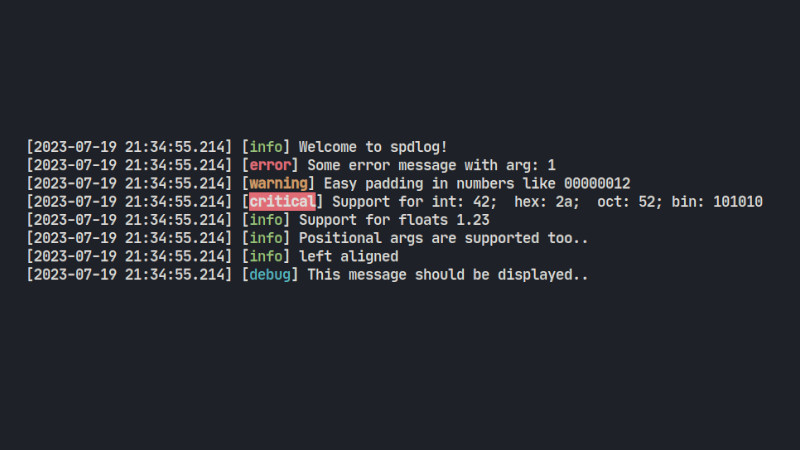
If you want to make your software logs LIKE A PRO, then SpdLog is the best option!
It is a fast and complete C++ library for creating logs.
Installation
It is already available in the repository of most operating systems, so to install it simply use the package manager corresponding to your case:
- vcpkg:
vcpkg install spdlog - conan:
spdlog/[>=1.4.1] - Homebrew:
brew install spdlog - MacPorts:
sudo port install spdlog - Debian:
sudo apt install libspdlog-dev - FreeBSD:
pkg install spdlog - Fedora:
dnf install spdlog - Gentoo:
emerge dev-libs/spdlog - Arch Linux:
sudo pacman -S spdlog - openSUSE:
sudo zypper in spdlog-devel - conda:
conda install -c conda-forge spdlog - build2: depends:
spdlog ^1.8.2
But, if you want to compile and install manually, run the commands below:
Remembering that you need to have libfmt installed, as SpdLog uses it like addiction!
git clone https://github.com/gabime/spdlog
cd spdlog
cmake -B build .
cd build && make -j
sudo make install
cd ../..
rm -rf spdlogUsing
Its use can be applied in different situations, the most basic way is the example below:
main.cpp
#include "spdlog/spdlog.h"
int main(){
spdlog::info("Welcome to spdlog!");
spdlog::error("Some error message with arg: {}", 1);
spdlog::warn("Easy padding in numbers like {:08d}", 12);
spdlog::critical("Support for int: {0:d}; hex: {0:x}; oct: {0:o}; bin: {0:b}", 42);
spdlog::info("Support for floats {:03.2f}", 1.23456);
spdlog::info("Positional args are {1} {0}..", "too", "supported");
spdlog::info("{:<30}", "left aligned");
spdlog::set_level(spdlog::level::debug); // Set global log level to debug
spdlog::debug("This message should be displayed..");
// change log pattern
spdlog::set_pattern("[%H:%M:%S %z] [%n] [%^---%L---%$] [thread %t] %v");
// Compile time log levels
// define SPDLOG_ACTIVE_LEVEL to desired level
SPDLOG_TRACE("Some trace message with param {}", 42);
SPDLOG_DEBUG("Some debug message");
}To compile run without additional flags:
g++ main.cpp
./a.outFor more information, visit the repository.




